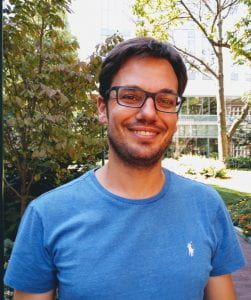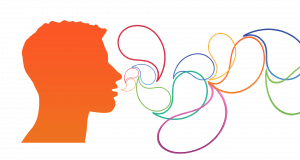“Every time we use language, we are saying something about what the world out there is like — but also about who we are, where we come from, what we like.”
 An interview with Andrea Beltrama, PhD (MindCORE Postdoctoral Fellow, UPenn)
An interview with Andrea Beltrama, PhD (MindCORE Postdoctoral Fellow, UPenn)
By: Michelle Johnson (1/31/20)
Did you always want to become a scientist growing up?
In my case it was completely serendipitous—I wanted to become a sports writer. That’s how I started studying communication, and then I did become a sports writer while I was in Italy. However fun it was, without realizing it, I really got into the nitty gritty and the theory and the content of the stuff I was studying at school. That’s when I realized that I might want to enter into something like that.
Is there a particular question that drives you right now?
What drives me as a linguist is to understand what goes into determining the messages we communicate when using language. We do so many things at once—we describe how things are, but we also say something about ourselves. Every time we use language, we are saying something about what the world out there is like — but also about who we are, where we come from, what we like. These functions of language have been very widely investigated independently, but what is new and what really interests me is connecting them.
Has studying this topic taught you anything about yourself and how you speak?
It’s the blessing and the curse of linguistics. Because language is so ubiquitous and everyone is constantly using language, we have constant access to data and insights. [This] is great because we’re constantly rediscovering that what we took for granted is actually a very complex object of investigation. The downside is that it can become an obsession for linguists. I see relationships or friendships being strained by linguists asking, “Could you just repeat what you said exactly how you said it because I want to figure out why you used the subject in this position?” I’m joking, obviously, but there’s some truth to this. I think sometimes we over-do it, and it’s very hard to resist. But I tend to look at the positive side, and I really see it as a more of an exciting thing than a problem.
Has anything surprised you going from a student role to a researcher role?
There’s this idea that you’re a student, and now all of a sudden you end up being a scholar. But as a matter of fact, a scholar is always a student, you’re always learning from others. What you have to add is being able to develop the voice of someone who has something to say. It’s not easy, especially in the beginning because the first thought I had and a lot of people have is “Why should people listen to me? Why should I have something to say when there’s so many other people that do this?” I think everyone in their first year of grad school has to go through [that]. But I think it’s a false dichotomy—we might become producers of knowledge, but we will always be consumers of knowledge, thank God.
What’s the best advice you’ve ever received?
I really appreciated my PhD advisors’ drive to push me to explore new things and to never take anything for granted, including (and especially!) their own work. Sometimes supervisors want to mold their students and have them buy into their own ideas and framework. What my supervisors did was completely opposite; in fact, they’d get upset if I were too reliant on the stuff they did or wrote in the past. That really pushed me to develop critical thinking and to turn into someone who has his own independent way of thinking, and I’ll be forever grateful for that.
Is there anything else you want people to know about what you do?
I want to think of ways in which studying language and linguistics could engage the general public. Language is this incredibly powerful resource to bond, but it can also be incredibly divisive and discriminatory, especially in the very divisive climate we have now pretty much across the world. We often see conflicts and divisions sparked by, or at least associated with, people getting upset with the way other people speak.
I think we as linguists have the duty to try to bring in our expertise and engage the public on these issues. Our science rests on the crucial idea that variation in the way different people speak is an opportunity for enrichment, and ultimately an opportunity of scientific discovery, [as opposed to] a reason for discrimination or suspicion.
Sometimes, however, we [Linguists] tend to contribute this perspective in a confrontational fashion — we present ourselves as scientists on a mission to eradicate and fight laypeople’s ideas, and this often exacerbates already existing conflicts, ultimately undermining our voice. Obviously, the idea of debunking the stereotypes and the potential discrimination linked to different ways of speaking is extremely important. But I think a more conducive way of attaining this goal is to create a dialogue in which we enrich and inform a debate, as opposed to coming in and saying “No, you got it wrong. That’s how it works; we’re linguists and we’re the only ones who know about this”. It’s tricky, it’s very hard, and it requires a lot of work and skills. But I think going forward it’s going to be more and more important to be good at that, and we should all make an effort to contribute in this direction.
Click here to learn more about Dr. Beltrama and his work.
Click here to go back to the “Interviews with Scientists” page.
